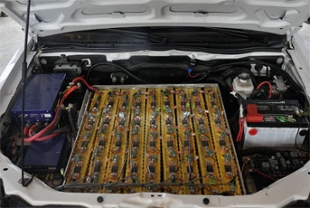ISAT Senior Symposium: Batteries Power Truck Once Fueled by Gas
News
Just before Christmas break, Justin Stevens was putting the finishing touches on a battery pack to fuel his senior capstone project, a pickup truck converted from gasoline to electric power. Things didn't work out so well.
"We made a bad connection and it fried all the chips on it," Stevens said. "It had taken me a week to wire it all up so I had to totally restart. At that point, it kind of brought us all down."
With 45 lithium ion batteries to wire, it was no small task, but the re-wiring went well and the truck is almost ready for daily use. In tests, the Chevy Colorado has gone over 60 mph.
"It drives just like a regular truck, you just don't hear a motor. That's the biggest difference," said Drew Loso, another senior who worked with Stevens. "The difference between an electric vehicle and a regular gas-powered truck is you get all that power at once. There's no buildup, so you feel it as soon as you put your foot down. It's a jolt."
The project involved much more than just removing a gasoline engine and replacing it with a battery pack. For one, Loso and Stevens admitted they didn't know much about cars and relied on the expertise of JMU auto technicians.
"Without the auto technicians, we would have nothing today," Loso said. "They were really integral in the knowledge that we didn't know and then what they didn't know, we kind of filled in those blanks. It was perfect teamwork."
Loso and Stevens also had to consider who would use the truck - JMU Facilities Management - and how it would be used. The truck will be a teaching tool for those who drive it as well.
"Another part of the project that we wanted to focus on was lifestyle changes," Loso said. "The people that go out there and have the pedal to the metal all the time, it's going to run the batteries down a lot quicker than if you're a smart, cost-effective driver."
Among the many lessons Stevens and Loso learned was that there is plenty of room to advance electric vehicle technology. "It's hard to get a car to travel long distances still," Stevens said. "This one's only going to last for daily use on campus. That's definitely the hardest part, I think, getting the charges to last longer."
With oil supplies dwindling in the U.S. and around the world and with automakers rushing to get electric vehicles to market, the timing of the electric truck project couldn't have been better, said Chris Bachmann, associate professor of integrated science and technology and the advisor on the project.
"With eight cents a kilowatt hour, we can charge this thing and drive all day and it's going to cost us less than it's going to cost to run regular gasoline," said Bachmann. "And it's using resources that are available right here in the United States."

